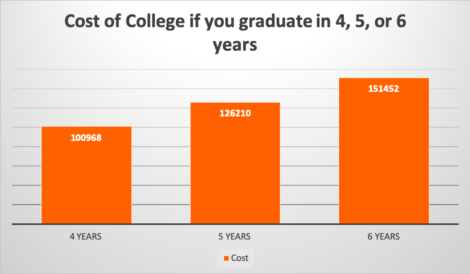The Cost of Your Degree
How much does it cost to go to UT San Antonio?
Financial Aid determines a cost of attendance (COA or budget) each year for students attending UT San Antonio. The COA is based on the average cost a student will incur for the year, this includes: tuition and fees, books, housing (whether you are living on campus, off campus or at home with family), food, transportation and personal expenses.
This COA may be estimated higher than what your actual costs may be. You can use our Rowdy Cents Budget Worksheet to help evaluate your actual costs. Once you have your financial aid offer from the schools you are interested in attending, you can also use the following calculator provided by the government’s Consumer Financial Protection Bureau to compare financial aid packages and college cost.
Why does graduating in four years matter?
Most bachelor degree programs at UT San Antonio require the successful completion of 120 hours to graduate. This means for students to graduate in four years, they must take 30 credit hours in annually. This can be a combination of 15 hours in fall and spring or take 12 hours in fall and spring and a minimum 6 in the summer. Students who only take 12 hours in fall and spring will end up taking an extra year to earn their degree (and possibly longer if their degree plan requires more than 120 hours).
Here are some tips to help students graduate on time:
- Meet with your academic advisor regularly
- Follow your degree plan and the suggested sequence of classes where possible.
- Average 30 semester credit hours annually
- Maintain a 2.0 cumulative GPA
- Meet with your academic advisor when you reach 45 and 75 earned credit hours to ensure you’re on track with your degree plan
- Before making changes to your class schedule, it’s a good idea to meet with your academic advisor to understand how these changes impact you
How does this translate financially? If you think about it, your costs associated with college are much more than just tuition and books. There are potential housing costs, meals, transportation and other personal expenses. If you take an extra year to graduate, that means an extra year of expenses (and if you’re borrowing loans, an additional year to take on debt).

Note: The above chart is based on the Cost of Attendance for the 2019-20 academic year. This chart is just an estimate of what students will spend over the course of 4,5, or 6 years but is not a set amount of what students could potentially spend.
Lost Opportunity and Earning Potential
Here’s a hypothetical example of lost opportunity and earning potential. For this example, these three hypothetical undergraduates all began college at the same time, did not need any developmental courses and had the same number of credit hours for their degrees (120 hours). In the below example, both Student B and Student C lost opportunities in comparison to Student A because they decided to delay graduation.
| Degree Programs were each 120 credit hours | Student A (Graduated in 4 years) |
Student B (Graduated in 5 years) |
Student C (Graduated in 6 years) |
|---|---|---|---|
| Time to Degree | 30 credits earned per year (10 semesters) | 24 credits earned per year (10 semesters) | 20 credits earned per year (13 semesters) |
| Tuition, Fees and Book Costs | $44,616 | $55,770 | $66,924 |
| Hours X Semester (Fall and Spring) | 15 hrs x 8 semesters | 12 hrs x 10 semesters | 9 hrs x 12 semesters & 12 hrs x 1 semester |
| Hours X Semester (Summer) | 0 hours | 0 hours | 0 hours |
| Summer job wages** | $7,612.50 | $10,150 | $0 |
| Part-time job year round (no benefits)*** | $0 | $0 | $9,360 |
| 5th year career salary earned (with benefits)**** | $41,920 | $0 | $0 |
| 6th year Career salary earned (with benefits)**** | $41,920 | $41,920 | $0 |
| 7th year Career salary earned (with benefits)**** | $41,920 | $41,920 | $41,920 |
Texas resident UT San Antonio tuition and fees are based on the 2019-2020 academic year. Keep in mind tuition may increase each year you are in school. Books are estimated at $1000 per academic year or $500 per semester.
**The summer job is estimated at 35 hours/week at $7.25/ hour x 10 weeks x 3 or 4 summers worked with no benefits.
***The part-time job is based on 1,040 annual work hours and estimated at $9/hour with no benefits.
****The estimated entry-level career annual salary of $32,000 plus an estimated 31% for or benefits. Salary listed does not include any merit raises.
Need more help to understanding the impact of graduating in four? The offices below are able to assist you:
One Stop Enrollment Center
Academic Advising
